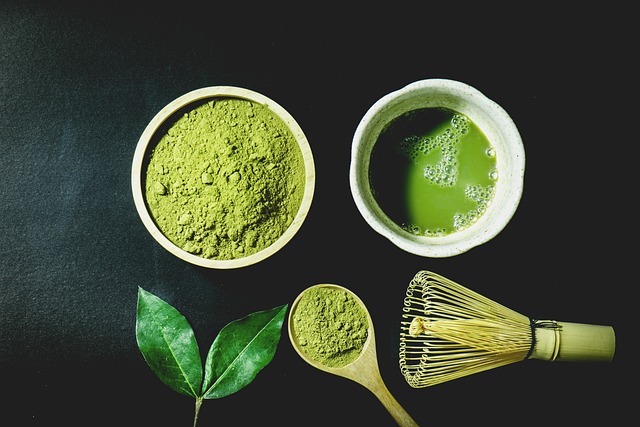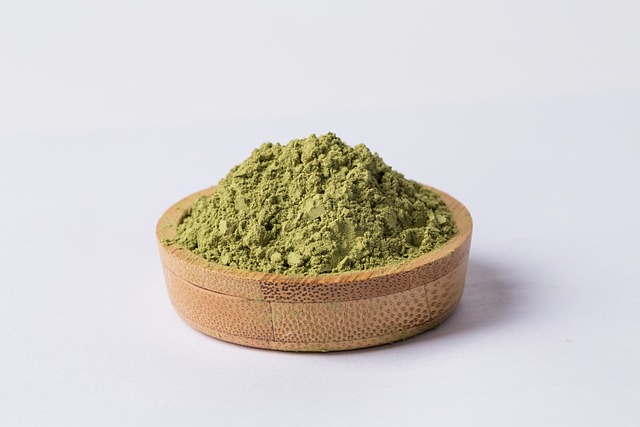Matcha tea is a traditional beverage originating from Japan that has been gaining popularity worldwide. It is made from finely ground green tea leaves and has a distinct flavor that many people love.
Although similar to regular green tea, matcha is unique in many ways. It has many nutritional and health benefits, and can be enjoyed in many ways.
In this article, we will explore the many benefits of matcha tea and how to select and prepare it.
Introduction to Matcha Tea
What is matcha tea?
Matcha is a finely ground powder made from the leaves of the Camellia sinensis plant. This plant is the same one used to produce green and black tea. The leaves are shade-grown before being handpicked and then steamed and dried. This process preserves the nutrients and antioxidants in the leaves. Once the leaves have been dried, they are de-veined, de-stemmed, and ground into a fine powder. This powder is what we know as matcha.
Origin and history of matcha
Matcha originated in Japan over 800 years ago. It was first used by Zen Buddhist monks as a way to improve focus and alertness during meditation. Matcha has been a part of Japanese culture ever since, enjoyed in a variety of recipes and beverages. Today it is gaining in popularity around the world, and is used in many different ways.
How is matcha different from regular tea?
Matcha is a fine powder, unlike regular tea, which is made from whole leaves. This means that when you drink matcha, you are consuming the entire tea leaf. This results in a much higher concentration of nutrients and antioxidants than regular tea. Matcha also has a distinct flavor that many people enjoy.
Nutritional benefits of matcha
Matcha is a great source of antioxidants, vitamins, and minerals. It is a rich source of polyphenols, which are powerful antioxidants that help reduce inflammation and protect the body from disease. Matcha is also high in vitamin A and vitamin C, as well as calcium, iron, and potassium. It is naturally lower in caffeine than regular tea, making it a great option for those who are sensitive to caffeine.
Health Benefits of Matcha Tea
Matcha is more than just an enjoyable beverage; it is also a powerhouse of health-promoting nutrients. The health benefits of matcha tea are abundant and numerous, ranging from its potential to reduce cancer risk to its ability to improve heart health and metabolic rate. Here, we’ll take a look at some of the most potent health benefits this ancient tea has to offer.
Matcha’s Impact on Cancer Risk:
Research has shown that certain antioxidants found in matcha, such as catechins and polyphenols, have cancer-fighting properties. These antioxidants help to inhibit the growth of cancer cells and even destroy them. Furthermore, matcha tea contains the antioxidant, EGCG, which is known to have anti-cancer and anti-tumor properties.
Improving Heart Health with Matcha:
The polyphenols found in matcha tea have been shown to reduce cholesterol levels, which in turn reduces the risk of heart disease. This is because the polyphenols can inhibit the absorption of cholesterol in the body. Additionally, research has shown that drinking matcha tea can reduce blood pressure and improve circulation.
Positive Effects on Metabolic Rate:
The catechins found in matcha tea are known to increase the body’s metabolism, which can help people lose weight. Additionally, research has shown that matcha tea can reduce the absorption of fats and carbohydrates, which can also help promote weight loss.
Matcha’s Benefits for Skin Health:
Matcha tea contains high levels of epigallocatechin gallate (EGCG), which is a powerful antioxidant that protects skin cells from damage caused by environmental factors, such as UV radiation and pollution. EGCG can also help to reduce wrinkles and other signs of aging. Additionally, matcha tea has anti-inflammatory properties, which can help reduce skin redness and irritation.
Overall, matcha tea is an incredibly beneficial beverage with a wide range of health benefits. From reducing cancer risk to improving heart health and metabolic rate, as well as providing anti-inflammatory and skin-protective effects, there are many reasons to include matcha tea in your daily diet.
Cognitive Benefits of Matcha Tea
Matcha tea, derived from the Japanese green tea powder, has long been considered a valuable beverage with many potential health benefits. In addition to providing a wealth of vitamins, minerals, and antioxidants, matcha is also known for its effects on cognitive function and mental health. Studies have identified a range of cognitive benefits associated with matcha consumption, such as improved memory, increased concentration, and increased alertness and focus.
Boosting Memory with Matcha
Research has shown that matcha tea has the potential to improve memory and learning capacity. Studies suggest that this is due to matcha’s ability to increase levels of the neurotransmitter acetylcholine, which is associated with cognitive performance. Matcha has also been found to contain compounds known as catechins, which have been linked to improved memory formation and recall.
Enhancing Concentration with Matcha
Matcha tea is also associated with enhanced concentration. The caffeine and L-theanine content of matcha has been linked to improved focus and reduced feelings of fatigue. Studies have shown that matcha consumption can improve alertness, attention, and reaction times. Matcha has also been found to have a calming effect, reducing feelings of stress and anxiety that can interfere with concentration.
Increasing Alertness and Focus
Matcha is known to have a stimulating effect on the body, due to its caffeine content. Research suggests that this can increase alertness and focus. Studies have also found that matcha can improve reaction times, which is beneficial for tasks that require quick responses. It is also believed that matcha tea can improve the ability to perform tasks that require sustained attention, such as problem solving.
The combination of caffeine and L-theanine in matcha tea is beneficial for cognitive performance, as the two compounds work together to increase alertness, improve focus, and reduce feelings of stress and anxiety. Matcha tea is a natural way to improve cognitive function, without the side effects associated with caffeine.
Mental Benefits of Matcha Tea
Matcha tea is known for its relaxing and calming properties, making it an ideal beverage for those who experience frequent stress or who wish to create a calming atmosphere. Studies have shown that matcha tea contains an amino acid known as L-theanine, which helps to promote relaxation and reduce stress without causing drowsiness. In addition, L-theanine has been shown to improve mood, reduce anxiety, and increase feelings of wellbeing.
Matcha tea also offers a range of mental benefits. Studies have shown that consuming matcha can help increase levels of serotonin and dopamine, both of which are associated with improved mood and feelings of contentment. Additionally, consuming matcha has been associated with increased alpha brain waves, which have been linked to improved focus and concentration.
Matcha tea can also help to improve cognitive function. Studies have shown that consuming matcha can help to improve reaction time, memory, and learning. Additionally, matcha can help to increase alertness and reduce fatigue, making it an ideal beverage for those who need to stay focused and alert throughout the day.
Lastly, matcha tea can reduce mental fatigue and improve concentration. Studies have shown that consuming matcha can help to reduce stress and anxiety, while also helping to improve concentration. Additionally, consuming matcha can help to reduce levels of the stress hormone cortisol, which can help to reduce feelings of stress and anxiety and improve overall mental wellbeing.
It is important to note that, while matcha does offer a range of mental benefits, it is not intended to be a substitute for professional medical advice. It is important to consult with your healthcare provider before consuming matcha to ensure that it is the right choice for your individual needs and health.
How to Select Quality Matcha Tea
When selecting matcha, it is important to choose a quality product that will give you the best health benefits. There are several different grades of matcha, so it’s important to understand the differences and choose the grade that best meets your needs. Here are some factors to consider when selecting matcha:
Grading: Matcha is typically divided into three grades: ceremonial, culinary, and classic. Ceremonial grade matcha is the highest quality and is made from the youngest and most tender leaves. It has a bright green color and a sweet, delicate flavor. This grade is best for traditional tea ceremonies and for drinking straight. Culinary grade matcha is made from older, mature leaves and has a less vibrant color. It is the most affordable grade and is most often used in cooking and baking applications. Classic grade matcha is a blend of the two and is best when used in beverages like lattes and smoothies.
Source: Quality matcha is typically sourced from Japan, where the best matcha is grown and produced. Make sure to check the label and verify the country of origin.
Organic: Organic matcha is grown without the use of fertilizers and other chemicals. It is usually more expensive but offers the highest quality and flavor.
Color and Flavor: High-quality matcha should be a vibrant green color. It should also have a sweet, mellow flavor with no bitterness.
Safety: When selecting matcha, make sure to look for organic and non-GMO certifications to ensure the product has been tested and is free of toxins and other harmful substances.
When selecting matcha, it is important to do your research. Make sure to read reviews, check labels, and understand the different grades of matcha available. This will help you select the best quality matcha for your needs.
How to Prepare Matcha Tea
As with any other type of tea, there are a number of different ways to prepare matcha. The traditional Japanese preparation method involves using a bamboo whisk called a ‘chasen’ to mix the powdered tea with hot water. This ensures that the tea is properly blended and that the resulting beverage has a smooth texture. It also creates a beautiful, frothy foam on top.
To prepare matcha this way, first, measure out one teaspoon of matcha and add it to a large bowl. Then heat a cup of water to just below boiling, and add it to the bowl. Use the chasen to whisk the tea and water together until the tea is completely dissolved and the mixture is frothy and smooth. Once the tea is ready, pour it into a cup and enjoy.
For those who don’t have access to a chasen, there are still many delicious ways to prepare matcha. A simple approach is to fill a mug or cup with hot water, then add one teaspoon of matcha and stir with a spoon or whisk. This method is quick and easy, and it is also possible to add milk or sweeteners to the mix.
For a more creative way to enjoy matcha, try adding it to smoothies or other food recipes. Matcha adds a subtle sweetness and a distinct earthy flavor to a variety of dishes. It can be used as an ingredient in cakes, muffins, cookies, and other sweet treats, or as a topping on oatmeal, yogurt, and other breakfast dishes.
For those looking for a cold beverage, chilled matcha can be made by combining one teaspoon of matcha with a small amount of hot water. Once the tea is fully dissolved, add ice and any additional ingredients such as milk, honey, or lemon juice. This mixture can then be blended to create a refreshing summer drink.
Finally, matcha can also be used to create a variety of cold and hot latte-style beverages. To make a matcha latte, simply combine one teaspoon of matcha with your choice of milk, add sweetener if desired, and whisk until the tea is fully dissolved. This mixture can be served hot or cold, depending on your preference.
As you can see, there are many simple and delicious ways to prepare and enjoy matcha tea. From the traditional Japanese preparation method to creative recipes, there is no shortage of ways to get the most out of this amazing beverage.
Conclusion
Matcha tea has been used by the Japanese for centuries as a way to improve overall health and well-being, and modern research is now beginning to prove the many positive benefits of matcha. Matcha is loaded with antioxidants, vitamins and minerals, and has been found to reduce the risk of cancer, improve heart health, and boost metabolic rate. It has also been shown to help boost memory and concentration, increase alertness and focus, and provide stress relief and improved mood.
When shopping for quality matcha, it’s important to know that not all matcha is the same. Different grades of matcha are available, and it’s important to understand the difference in order to get the most out of your matcha. Factors to consider when purchasing matcha include color, taste, and aroma. Additionally, it’s important to be aware of any possible contamination or other safety concerns when selecting matcha.
Preparing matcha tea is also an important part of the experience. The traditional Japanese preparation method involves a special tea ceremony, but there are also easy-to-follow recipes and other ways to enjoy matcha that don’t require special equipment.
In conclusion, matcha tea offers a wide range of health and mental benefits and is easy to incorporate into a daily lifestyle. Matcha offers the perfect balance of energy, mental clarity, and health benefits, and is a great way to enjoy the unique flavor and aroma of green tea. Regardless of whether you choose to enjoy it in the traditional Japanese tea ceremony or just add a teaspoon to your favorite smoothie, matcha is a great addition to any health and wellness routine.


